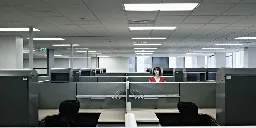Like Elon Musk, 1 in 3 bosses admit they are pushing RTO because they're so upset about wasting money on all those empty desks
Like Elon Musk, 1 in 3 bosses admit they are pushing RTO because they're so upset about wasting money on all those empty desks

fortune.com
Like Elon Musk, 1 in 3 bosses admit they are pushing RTO because they're so upset about wasting money on all those empty desks


